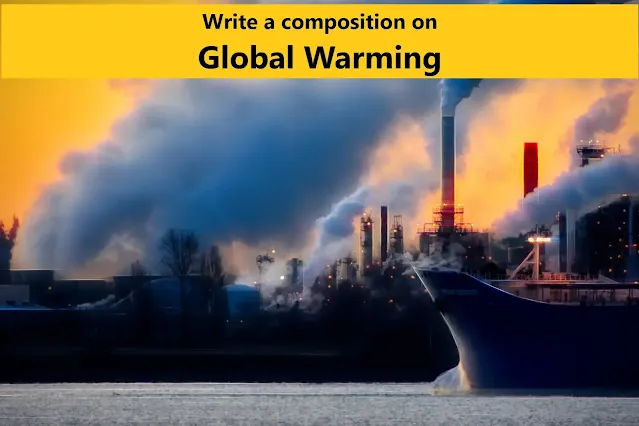Write a composition on Global Warming
Global Warming
Global warming is the long-term warming of the planet caused by the increase in greenhouse gases in the atmosphere. These gases, such as carbon dioxide and methane, trap heat from the sun, preventing it from escaping back into space. This is known as the greenhouse effect, and it is a natural process that helps to regulate the temperature of the Earth. However, human activities, such as burning fossil fuels and deforestation, have greatly increased the amount of greenhouse gases in the atmosphere, leading to a significant and potentially dangerous increase in global temperatures.
The evidence for global warming is overwhelming and undeniable. The Earth's average surface temperature has risen by about 1.8 degrees Fahrenheit (1 degree Celsius) since the late 19th century, and the rate of warming has nearly doubled in the past 35 years. This may not seem like a lot, but it has already had significant impacts on the planet. The polar ice caps are melting at an alarming rate, causing sea levels to rise and threatening the habitats of polar bears and other Arctic wildlife. Extreme weather events, such as heatwaves, hurricanes, and floods, are becoming more frequent and more severe. These events can have devastating consequences for human communities, particularly those that are already vulnerable due to poverty or lack of resources.
The impacts of global warming are not limited to the present day. The effects of rising temperatures will be felt for generations to come. For example, the warming of the oceans is causing the acidity of seawater to increase, which is harmful to marine life. This could have cascading effects on the entire ecosystem, as many species rely on the ocean for their survival. Additionally, the loss of biodiversity caused by climate change could have serious consequences for the stability of ecosystems and the services they provide, such as water purification and pollination.
Despite the clear evidence of global warming and the urgent need to address it, there are still those who deny the existence or importance of the problem. Some argue that the warming of the planet is a natural process that has occurred throughout history, and that human activity has had little impact. Others claim that the costs of addressing global warming, such as transitioning to renewable energy sources, would be too high. However, these arguments are not supported by scientific evidence. The current rate of warming is unprecedented in human history, and the majority of scientists agree that human activity is the primary cause. Moreover, the costs of inaction are likely to be much greater in the long run. The longer we wait to address the problem, the more difficult and expensive it will become to mitigate the worst impacts of global warming.
So, what can we do about global warming? The most effective way to reduce greenhouse gas emissions is to transition to clean, renewable energy sources, such as wind and solar power. This will not only help to reduce emissions, but it will also create jobs and stimulate economic growth. Individual actions, such as using energy-efficient appliances and reducing energy consumption, can also make a difference. Planting trees and protecting forests is another important step, as trees absorb carbon dioxide from the atmosphere. Finally, it is important for governments and businesses to take a leadership role in addressing global warming by implementing policies that reduce emissions and support the transition to clean energy.
In conclusion, global warming is a real and pressing problem that threatens the well-being of the planet and all its inhabitants. The evidence is clear and overwhelming, and the time to act is now. By transitioning to clean, renewable energy, protecting forests and biodiversity, and taking individual actions to reduce our own carbon footprints, we can help to mitigate the worst impacts of global warming and create a better future for all.





